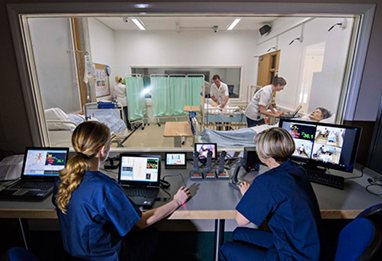Programme structure
Assistant Practitioners attend university one day a week during term time and will continue to have one day per week off-the-job learning out of term.
With support from their employer, apprentices are required to spend 20% of paid working hours on studies and be able to evidence this. This is a statutory requirement for apprenticeships and the funding is conditional on this being met.
Off-the-job learning includes activities which have not previously been a part of their role or that further apprentices development into new areas.
As a student on this course you’ll also get to participate in Schwartz Rounds – hour-long sessions where students come together to listen to stories and share reflections in a supportive and confidential environment. The sessions offer the opportunity to reflect on the emotional aspects of clinical practice and are designed to support students and recent graduates working in complex settings.
Modules and core skills
This programme is being redeveloped.
This page will be updated when the new curriculum is approved.
Making sure that what you learn with us is relevant, up to date and what employers are looking for is our priority, so courses are reviewed and enhanced on an ongoing basis. When you have applied to us, you’ll be told about any new developments through Student View.
Teaching and assessment
Tuition on the programme is provided by experts based within the university and visiting lecturers from practicing clinical areas as well as service users. Tutors are supported by a Practice Educator within public and private healthcare organisations to ensure the most up-to-date and relevant training as well as providing additional support for the apprentice.
The curriculum is designed to encourage a two-way interaction of research and teaching. Blended learning is used extensively to engage with apprentices who will also have access to online learning and teaching resources.
A range of summative assessment methods are used throughout the programme. These are related to module aims and learning outcomes, allowing apprentices with a range of abilities to succeed.They include:
- essays
- numeracy tests
- poster presentations
- video presentations
- e-learning assessments
- project reports
- oral presentations.
Facilities
Therapy, clinical skills and simulation
Our newly refurbished practice development rooms at Falmer provide spaces for apprentices to gain confidence in engaging with therapeutic interventions and clinical skills, applying their new knowledge to practice. Apprentices’ progress will be assessed and monitored throughout the course.
Apprentices benefit from practising skills in an environment that simulates real-life professional experiences. Learning by simulation with state-of-the-art mannequins enables them to practice in a safe environment under supervision so they can confidently apply their knowledge and skills in professional practice.
Community flat
The community flat is a replica home environment where you’ll be able to practice skills and learn from other students while taking part in realistic training scenarios.
Every room is fitted with cameras and microphones, so that you can be directed and monitored from the control room, while the observation room provides the opportunity to review, playback and debrief.

Employer and apprentice commitments
In order to deliver the programme, the employer undertakes to:
- conduct a workplace induction and set out a contract of employment
- provide an appropriately qualified workplace mentor to support the apprentice
- attend the apprentice’s progress review (four times per year)
- release the apprentice for scheduled off-the-job training
- have an Apprenticeship Agreement in place from the start of the programme.
Throughout the programme, apprentices will:
- attend the workplace for the agreed pattern as set out in the employment contract
- record all training sessions and off-the-job learning
- attend scheduled university learning sessions and complete all assessments as required by the university and the End Point Assessment Organisation
- behave in a safe and responsible manner at the workplace and university
- engage with regular progress reviews
- complete a professional development portfolio throughout the apprenticeship.
Fees and funding information for apprentices
Course fees
As an apprentice, the cost of your learning programme is covered by your employer through their Digital Apprenticeship Service (DAS) account.
Student finance
Higher and degree level apprentices are not eligible for any element of student finance. This is because they receive a salary instead of the student loan package. However, if you are experiencing any financial difficulties, please contact the Student Advice Service on 01273 642 888.
Learning support
Apprentices studying at Higher and degree level may be able to access funding in relation to additional support, but this is available through the university and not Disabled Students Allowance. Apprentices may also be able to apply for Access to Work funding for work-based equipment and software. Please contact the Disability and Learning Support team on 01273 643 799.
Living costs and benefits
Higher and degree level apprentices must fulfil the standard eligibility criteria in order to apply for means tested benefits such as Universal Credit, Child Tax Credit and Housing Benefit. If you have any questions about entitlement to benefits, please contact the Student Advice Service on 01273 642888.
Higher and degree level apprentices who are undertaking a full-time mode of study can be treated as being exempt from paying Council Tax. Although some programmes require study on a day-release arrangement, this can still be classed as full-time study. You will need to obtain a letter from the Student Support Desk at any campus and send this to your Council Tax department when you register on the programme.
Other
Brighton and Hove bus discount
NUS card